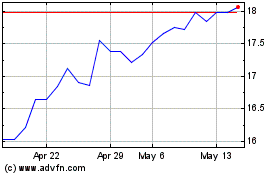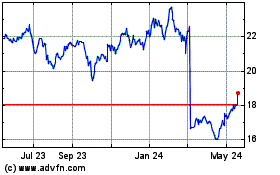When Going Green Means Making FX Exposure Changes
March 04 2011 - 7:01PM
Dow Jones News
SANTA BARBARA, Calif.--Trying to be environmentally friendly can
be good business for companies, but it often has an unexpected
result: It can change a company's foreign-exchange exposures and
sometimes puts a damper on results.
Foreign-exchange risks don't usually figure into companies'
pro-environment strategies. The environment programs are usually
just based on a desire to preserve materials or get some good
publicity. But every time a decision is made to do business
differently across an international border, a company's
foreign-exchange exposure changes, affecting its hedging needs.
Sodexo (SDXAY, SW.FR), the French food-service and
facilities-management company that serves 50 million diners every
week, announced this week that within four years, all the fish it
buys must be certified by an environmental nonprofit to be
sustainable. That's in line with the company's plans to move toward
feeding its customers food that's better for the environment and
their health.
But what happens if Sodexo's suppliers can't get the certified
fish because, for instance, a massive oil spill interferes with
fishing? Suddenly, the fish its vendors sell could be coming from a
different country.
Something similar to that happened recently when frost hit
tomatoes growing in Mexico and Florida, a combination that forced
Sodexo to substitute beets on some salad bars it serves. In
December, snow ruined Brussels sprout harvests in the U.K., forcing
food companies to make similar substitutions.
"Increasingly we're seeing local failures affect our supply
chain," Arlin Wasserman, Sodexo's vice president of sustainability
and corporate social responsibility, said at The Wall Street
Journal's ECO:nomics Conference. "Suppliers have to be more nimble
and search around the globe."
Sodexo said last month that its first-quarter results showed a
5.9% positive currency impact in total. The company said that it
accumulates expenses and revenues in the same currency wherever it
does business, minimizing its foreign-exchange impact and probably
its need to hedge.
As part of its sustainability program in 2009, Bayer (BAYRY,
BAYN.XE) started selling bottles of its Aleve pain medication
without boxes. Less packaging meant less waste, but it also meant
the expense of purchasing the box disappeared. And depending on
where a company sources that extra packaging, such a move can also
mean eliminating FX exposure.
-By Chana R. Schoenberger, Dow Jones Newswires; 212-416-4803;
chana.schoenberger@dowjones.com
Sodexo (PK) (USOTC:SDXAY)
Historical Stock Chart
From Apr 2024 to May 2024

Sodexo (PK) (USOTC:SDXAY)
Historical Stock Chart
From May 2023 to May 2024
